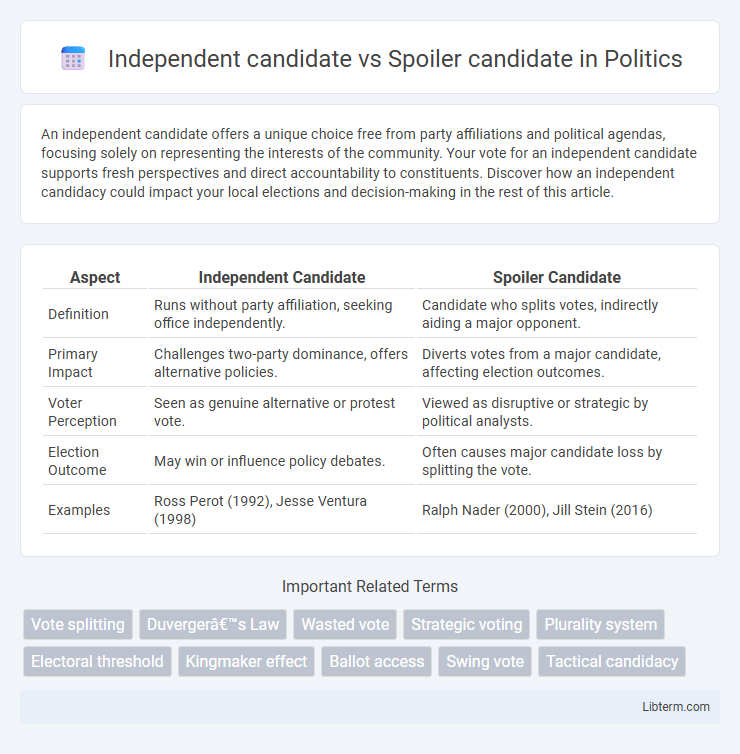An independent candidate offers a unique choice free from party affiliations and political agendas, focusing solely on representing the interests of the community. Your vote for an independent candidate supports fresh perspectives and direct accountability to constituents. Discover how an independent candidacy could impact your local elections and decision-making in the rest of this article.
Table of Comparison
| Aspect | Independent Candidate | Spoiler Candidate |
|---|---|---|
| Definition | Runs without party affiliation, seeking office independently. | Candidate who splits votes, indirectly aiding a major opponent. |
| Primary Impact | Challenges two-party dominance, offers alternative policies. | Diverts votes from a major candidate, affecting election outcomes. |
| Voter Perception | Seen as genuine alternative or protest vote. | Viewed as disruptive or strategic by political analysts. |
| Election Outcome | May win or influence policy debates. | Often causes major candidate loss by splitting the vote. |
| Examples | Ross Perot (1992), Jesse Ventura (1998) | Ralph Nader (2000), Jill Stein (2016) |
Understanding Independent Candidates
Independent candidates run for office without formal affiliation to established political parties, often appealing to voters seeking alternatives outside partisan frameworks. These candidates emphasize unique platforms that address specific community needs or ideological perspectives not represented by major parties. Understanding independent candidates involves recognizing their potential to influence election outcomes by attracting diverse voter bases and sometimes altering traditional party dynamics.
Defining the Spoiler Candidate Phenomenon
The spoiler candidate phenomenon occurs when a third-party or independent candidate draws votes away from a major candidate with similar ideologies, potentially altering the election outcome by splitting the vote. Unlike independent candidates who run without party affiliation aiming to present an alternative, spoiler candidates inadvertently influence the result by causing vote fragmentation. This effect is most pronounced in plurality voting systems where the candidate with the most votes wins, even without majority support.
Historical Examples: Independents and Spoilers in Elections
Independent candidates often emerge as viable alternatives in elections, as seen with Ross Perot's 1992 presidential run, where he captured nearly 19% of the popular vote. Spoiler candidates, such as Ralph Nader in the 2000 U.S. presidential election, are criticized for drawing votes away from major party candidates, arguably influencing outcomes--in Nader's case, potentially affecting the Florida vote count that decided the election. Historical examples highlight how independent and spoiler candidates can both disrupt traditional electoral dynamics and impact the final results in closely contested races.
Key Differences Between Independent and Spoiler Candidates
Independent candidates run without formal party affiliation and aim to present alternative choices, often focusing on distinct policy platforms. Spoiler candidates typically draw votes away from major party contenders, potentially altering election outcomes by splitting the vote. The key difference lies in an independent's intent to offer genuine alternatives versus a spoiler's impact on the electoral balance.
Voter Perceptions: Independent vs. Spoiler Candidates
Voter perceptions of independent candidates often highlight their appeal as genuine alternatives free from party constraints, attracting those seeking nonpartisan representation and fresh policy ideas. Spoiler candidates, however, are frequently viewed through a strategic lens, perceived as vote-splitters who may inadvertently aid the opposition by drawing votes away from major party candidates. This contrast influences voter behavior, with some hesitant to support spoilers due to fear of "wasting" their vote, while independents can inspire confidence as viable, principled contenders.
Impact on Major Parties and Election Outcomes
Independent candidates can attract voters dissatisfied with major parties, sometimes drawing crucial support away and altering election outcomes by reducing the vote share of a leading candidate. Spoiler candidates, often third-party or independents, disproportionately impact closely contested races by splitting the vote, enabling the less popular major party candidate to win. The presence of these candidates frequently pressures major parties to adjust campaign strategies and policy positions to recapture voter segments at risk of defection.
Electoral Systems and the Spoiler Effect
Independent candidates often face significant challenges in plurality electoral systems, where the spoiler effect can distort election outcomes by splitting the vote among similar political ideologies. The spoiler effect occurs when a third-party or independent candidate siphons votes from a major candidate, potentially allowing a less favored candidate to win. Proportional representation and ranked-choice voting are alternative electoral systems designed to mitigate the spoiler effect by more accurately reflecting voter preferences.
Media Framing of Independent and Spoiler Candidates
Media framing often portrays independent candidates as principled outsiders challenging the dominant two-party system, highlighting their potential to offer fresh perspectives and policy innovation. In contrast, spoiler candidates are frequently framed negatively, depicted as vote-splitters who inadvertently aid major party opponents by siphoning critical votes. This framing influences public perception by either legitimizing independents as viable alternatives or marginalizing spoilers as disruptive forces in elections.
Strategies for Success as an Independent Candidate
Independent candidates achieve success by focusing on grassroots mobilization and building a distinct platform that addresses voter concerns without party constraints. Prioritizing targeted outreach, leveraging social media, and establishing clear policy positions help differentiate them from spoiler candidates who inadvertently split votes. Strategic coalition-building and emphasizing a unifying message increase their chances of winning elections while minimizing the spoiler effect.
Future Trends: Reducing the Spoiler Effect in Elections
Emerging electoral reforms such as ranked-choice voting and proportional representation aim to reduce the spoiler effect by allowing voters to express true preferences without fearing vote splitting. Independent candidates stand to benefit from these trends as they can attract genuine support without inadvertently assisting opposing major parties. Increasing adoption of these voting systems across states and countries signals a shift toward more inclusive and representative elections.
Independent candidate Infographic

 libterm.com
libterm.com